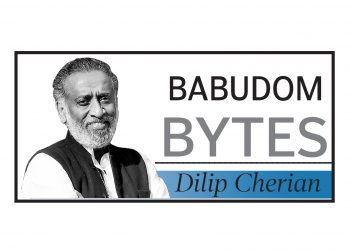Senior babus in Maharashtra are fretting due to the state government delaying postings. The most likely reason is the continuous tussle between Chief Minister Eknath Shinde and his Deputy Devendra Fadnavis. Though they firmed up an “unnatural” political alliance to gain power, the two have not yet settled down in their respective roles. Fadnavis may be the second in command but is clearly the one who calls the shots. Delayed appointments is just one result of this constant one-upmanship.
Sources informed DKB that a delegation of IAS officers met serially with Chief Secretary Manu Kumar Srivastava, Fadnavis and Shinde before six IAS officers from the 1992 batch were promoted to additional chief secretary rank last week. The delegation had to pressure the netas to urgently promote these officers since their batchmates in other states had already been promoted.
Meanwhile, things are yet to look up for five senior IPS officers in the state who do not have a post since mid-December as they were not assigned a position while being transferred. They have been idling since then waiting to be summoned for duty once the government makes up its mind on their next postings. Sources add that with the approaching budget session of the Maharashtra Assembly, and rumours circulating about a possible state Cabinet expansion, these postings may well be delayed further.
Digital divide nixes AP’s push for efficiency
It is proving to be an uphill task for governments to popularise app-based attendance. The Centre is discovering this after introducing the mandatory attendance of MGNREGA labourers. The mobile app was launched in May last year as a voluntary service. But last month, it was made mandatory for officials managing MGNREGA schemes at the panchayat level to upload photos of labourers at the worksites twice a day.
The aim is worthy – to ensure more transparency, accountability, and efficiency, and to root out corruption. But glitches in the implementation of the plan apart, some people fear that this is the Centre’s attempt to drive down payouts.
Now, Andhra Pradesh Chief Minister YS Jagan Mohan Reddy is facing similar protests from state government employees after deciding to introduce an app using facial recognition software to track staff attendance and location. At present, babus in Andhra Pradesh use an Aadhaar-enabled biometric attendance system to mark their attendance. Last year, the Reddy government introduced a facial recognition-based system in schools to track teachers’ attendance but met with backlash. Some of the concerns about the plan are of a practical nature: many babus do not own smartphones and do not know how to use them. The threat to privacy is yet another worry.
Clearly, there is a big gulf between the government’s intentions and the ground reality. Plugging the digital divide is the question that the government needs to address before initiating reforms.
Whose land is it, anyway?
Whose land is it, anyway? A small piece of land in the table tennis stadium complex in Jalandhar has pitted a senior Punjab IPS officer against a 2015-batch IAS officer.
The disputed land is part of the stadium but Additional Director General of Police, Punjab Armed Police-cum-Administrator of Punjab Waqf Board MF Farooqui claimed that it is Waqf land, and got a wall constructed to mark out the perimeter.
However, the same day municipal corporation workers arrived and demolished the wall, claiming it was an encroachment. The MC Commissioner Abhijeet Kaplish however defended the action, claiming there was no order of the tehsildar or the SDM to allow the Waqf Board to acquire the land.
The issue has escalated to the Punjab Sports Minister Gurmeet Singh, and now babus are pouring over the records to sort out the battle between the IAS and IPS officers.
Share a babu experience! Follow dilipthecherian@twitter.com. Let’s multiply the effect.
